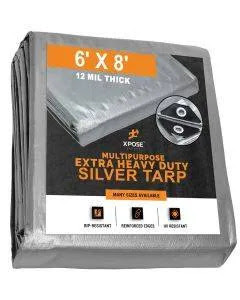Understanding Poly Plastic Sheets, Rolls, and Heavy-Duty Sheeting
Poly plastic sheets, poly rolls, and poly sheeting are versatile materials used in various industries, from construction to agriculture, and even in everyday home projects. These materials are made from polyethylene, a type of plastic known for its durability, flexibility, and resistance to chemicals. Whether you need a temporary weather barrier, ground cover, or moisture protection, these products offer reliable solutions.
What Are Poly Plastic Sheets?
Poly plastic sheets are flat, flexible sheets of polyethylene that are widely used in construction, painting, and landscaping. They provide an effective moisture barrier, protecting surfaces from water damage. For instance, when renovating a home, poly plastic sheet can be laid over floors or furniture to shield them from dust and debris. Additionally, they can be used in gardening to prevent weed growth by blocking sunlight from reaching the soil.
When using poly plastic sheets in outdoor settings, it is crucial to secure the edges properly to prevent them from being blown away by the wind. The heavy-duty nature of these sheets ensures that they can withstand harsh conditions, making them a reliable choice for long-term projects.
The Versatility of Poly Rolls
Poly rolls are similar to poly plastic sheets but are sold in a continuous roll, allowing for easier handling and storage. This format is particularly useful when covering large areas, as the roll can be unrolled to the desired length, cutting down on material waste. For instance, poly roll are often used in agriculture to cover crops, providing a protective barrier against pests and extreme weather conditions.
In addition to agricultural uses, poly rolls are frequently employed in construction to cover materials and tools, keeping them safe from the elements. The ease of use and flexibility of poly rolls make them a popular choice for contractors and DIY enthusiasts alike.
Benefits of Poly Sheeting
Poly sheeting refers to both poly plastic sheets and poly rolls, highlighting the material’s adaptability for various applications. One of the key benefits of poly sheeting is its resistance to water and chemicals, which makes it an excellent choice for projects requiring moisture control. For example, in crawl spaces or basements, poly sheeting can be used as a vapor barrier, preventing moisture from seeping into the area and causing mold or mildew.
Moreover, poly sheeting is lightweight yet durable, making it easy to transport and install. It can be used as a temporary enclosure or even as a protective covering during painting or construction work. Its versatility is unmatched, as it can be cut to size or overlapped for extended coverage.
The Strength of Heavy-Duty Poly Sheeting
When the project demands maximum durability, heavy-duty poly sheeting is the go-to option. This type of sheeting is thicker and more robust than standard poly plastic sheets, providing enhanced protection against punctures, tears, and harsh weather conditions. Heavy-duty poly sheeting is commonly used in construction sites where a strong, durable barrier is needed to protect materials and structures from damage.
In addition to construction, heavy-duty poly sheeting is also used in industrial settings, such as in the lining of ponds or as a protective layer for large machinery. Its strength ensures that it can withstand the demands of heavy use without compromising on performance.
Conclusion
Poly plastic sheets, poly rolls, poly sheeting, and heavyb duty poly sheeting are indispensable materials in various industries. Their versatility, durability, and ease of use make them ideal for a wide range of applications, from construction to agriculture. Whether you need a moisture barrier, ground cover, or protective layer, these polyethylene products offer reliable solutions that can withstand the test of time.

Comments
Post a Comment